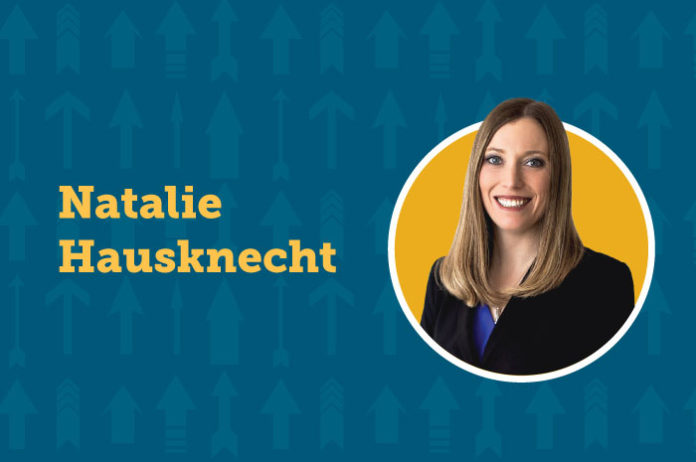
Before becoming a lawyer, Natalie Hauknecht helped governmental leaders around the world rebuild countries and adopt Democratic governments.
Now, as an associate at Gibson Dunn, working on government investigations and litigation is a smooth transition in her work.
Hauknecht has been practicing as an attorney since 2015, and in her career thus far, she has represented Fortune 500 clients in bet-the-business litigation and regulatory challenges. In the last year, she has represented clients like Facebook, Amazon and Uber, among other household names, in class action litigation involving worker classification laws and the ability to purchase consumer cannabis, as just an example. In her legal work and her international work before entering the profession, she has stood out among her peers in her work
She said she always wanted to become a lawyer. Her mother was a secretary for a judge, so she had an early introduction to the legal world. And through seeing friends go through legal processes and seeing justice issues such as racial discrimination touch people around her, she was drawn to the career.
Before following through with her goal of attending law school though, she spent nearly a decade working as an international consultant. She studied in Morocco on a National Security Education Program “Boren Scholarship” and also received a Marshall Scholarship to study the Middle East in the U.K.
And after the Iraq War, she spent a decade off and on in Iraq where she worked with the Kurdish people to rebuild. Through that work, she worked with President of the Kurdistan Region, Masoud Barzani, and worked on ideas about how to democratize and rebuild political institutions — “the best job a 22-year-old could have,” she said.
But after starting her family and wanting to spend less time away from her children, she resumed her path to the legal profession — and started law school the same day her oldest started kindergarten.
Hausknecht has now worked at Gibson Dunn since 2015 and focuses her practice on litigation and government investigations. She developed a niche with tech companies and works largely in privacy issues that arise as we transition to a technology-driven economy.
For instance, in 2019, she advised clients on new state and federal biometric privacy laws, has helped U.S. companies ensure their policies were compliant with the European General Data Privacy Regulation as well as the California Consumer Privacy Act, and has helped companies respond to new laws, regulations and emergency orders that have come up stemming from the COVID-19 pandemic.
She has also worked with Uber in several class action lawsuits that arose that sought preliminary injunctions to reclassify its drivers in California and Massachusetts as employees. Hausknecht worked to defeat the injunctions, explaining that they would harm drivers by denying them of pandemic benefits that Congress created specifically to help them.
Hausknecht said she got interested in the COVID-19 situation from the start, saying we’ve all had to adapt to the situation as it has continued to evolve. Local, state and federal governments came up with a range of policies to help ease the stress on companies, but whenever local regulations come up, it creates a challenge for companies, she said. Navigating those evolving circumstances is what attorneys are there for, she said.
In her legal career thus far, she’s been able to continue to use her international experience as well. She has led complex discovery teams, including a team of in-house and contract attorneys in a billion-dollar trade secrets and anti-trust case between two global giants, requiring the production of millions of documents. She has also helped multinational companies analyze their corruption risks and ensure compliance with the Foreign Corrupt Practices Act.
“I’m lucky to be at a firm like Gibson Dunn,” she said, noting not only the firm’s major corporate work but also its support for attorneys’ pro bono passions, such as her own work on behalf of a refugee from Belarus whom she helped fight removal from the U.S. “I take pleasure in knowing I can use my law degree to help people in a situation that is confusing or intimidating.”
Hausknecht said she was driven to pursue a career in law because of the personal interactions with the law she had seen. But through her legal career, she has had large-scale experience and a deep impact for her clients, be they governmental leaders or multinational corporations.
— Tony Flesor

